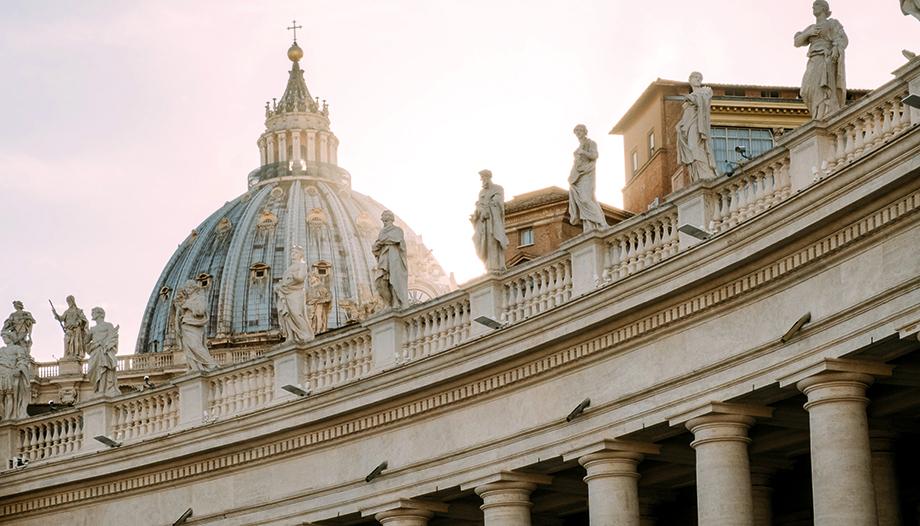On the 60th anniversary of the promulgation of the Dogmatic Constitution "Lumen Gentium," the Pontifical University of the Holy Cross of Rome hosted on November 19 and 20, 2024 an International Congress to reflect in general on the legacy of the Vatican Council II and how ecclesiology has evolved in recent decades. The event was organized in collaboration with the University of Navarra, the John Paul II Catholic University of Lublin and the Faculty of Theology of the Holy Cross and the University of Italian Switzerland in Lugano.
The path of ecclesiology
The first day of the Congress offered a historical analysis of the ecclesiological trajectory, given by Carlo Pioppi, professor of Church History at Holy Cross, who illustrated the two main currents of thought that developed between the French Revolution and the Second Vatican Council: on the one hand, the manualist tradition with a juridical and apologetic approach; on the other, new perspectives that rediscovered the Church as a "living organism guided by the Holy Spirit and inserted in history".
From the University of Navarra, Pedro A. Benítez analyzed the conciliar debate on the "organic structure" of the Church, highlighting how this idea became central in the drafting of Lumen Gentium, to the point of describing the Church as "a structured reality, a unified body" in which each member plays a vital role. Peter De May, of the Katholieke Universiteit Leuven, also elaborated on this concept, underlining how the chapters of the Constitution dedicated to the people of God, the laity and the hierarchy complement each other.
People of God and communion
Referring to the post-conciliar context, Hans Christian Schmidbaur of the Faculty of Theology of Lugano, for his part, emphasized how "communio", the fundamental principle of the conciliar document, should not be understood in a secular sense, but as "communio sanctorum", a profound union between God and redeemed humanity, in which the vertical dimension of the relationship with God assumes and continues to maintain primary importance.
It was the same experience during the communist regime in Poland, when there was a tendency to reduce the ecclesial reality to a purely institutional dimension, that Antoni Nadbrzezny, of the Catholic University of Lublin, spoke of. For the academic, Lumen Gentium restored an image of the Church as a "personal entity", a "community of persons united by the love of the Father, the Son and the Holy Spirit".
The second day of work moved on to a systematic analysis of the conciliar document, delving into the key concepts of the People of God, communion and synodality. From the Pope Benedict Institute of Regensburg, Christian Schaller illustrated the different facets of the "People of God" in Lumen Gentium, analyzing its prophetic, messianic and historical-eschatological dimensions. With regard to the missionary nature of this "people," Sandra Mazzolini, of the Pontifical Urbaniana University, spoke in particular of the role of the laity and the contribution that the Church can make in the area of intercultural dialogue, "the cornerstone of the Church's evangelizing mission, both universal and local."
Philip Goyret, former Dean of the Faculty of Theology at the University of the Holy Cross, also returned to the theme of "communion", defining it as a concept capable of synthesizing other fundamental elements of the Church, such as the mystery, the sacrament and the Eucharist. Therefore, it is not at all an abstract dimension, but something that is already realized in the local Churches and finds its maximum expression in the celebration of the Eucharist. Goyret then underlined the importance of avoiding a kind of "rivalry" between the ecclesiology of communion and that of the People of God, explaining how the former in no way excludes the social and juridical dimension of the Church.
The synodal challenge
Another aspect dealt with in the Congress, also linked to the current events of the pontificate of Pope Francis, was that of synodal ecclesiology, about which Miguel de Salis, Director of the Holy Cross Center for Priestly Formation, spoke. The speaker - who was also an expert in the last Synod in the Vatican - proposed an in-depth analysis of synodality, starting from its definition of "walking together" and analyzing its connection with the mission of the Church.
According to De Salis, synodality must be based on a "fundamental relational structure," avoiding both the rigidity of an excessive dependence on institutional forms and the risk of reducing the Church to a mere reflection of contemporary society. This "path" must be rooted in the "real plurality of community life". In this perspective, Vito Mignozzi, of the Faculty of Theology of Apulia, presented synodality itself as "the fruit of progressive conciliar reception," explaining that it is realized in an "essential nexus" that starts from the concreteness of local communities to embrace the universal dimension of the Church.
In short, sixty years later, Lumen Gentium continues to offer the Church a vision that embraces both the mystery of faith and the concreteness of history, inviting the different generations to recognize in communion and synodality not only operative structures, but ways of living and witnessing to the Gospel and of renewing the missionary impulse.








